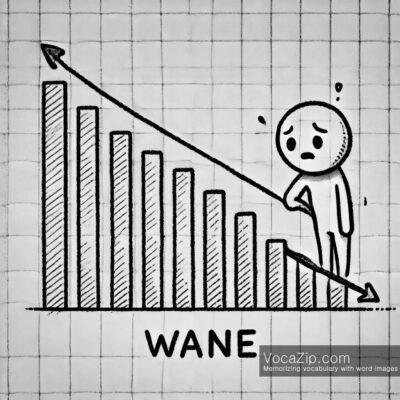wane meaning
wane :
decrease, decline
noun
▪ The wane of the moon is beautiful.
▪ The decrease of the moon is beautiful.
▪ There is a wane in interest for that topic.
▪ There is a decline in interest for that topic.
paraphrasing
▪ decline – a decrease in strength
▪ reduction – a smaller amount

wane :
to decrease, to lessen
verb
▪ The light will wane at dusk.
▪ The light will decrease at dusk.
▪ Her enthusiasm began to wane.
▪ Her enthusiasm started to lessen.
paraphrasing
▪ diminish – to make less
▪ fade – to lose brightness
wane :
decrease, decline
noun
▪ The wane of the season is noticeable.
▪ The decrease of the season is noticeable.
▪ A wane in sales can be concerning.
▪ A decline in sales can be concerning.
paraphrasing
▪ wane – decrease
▪ downturn – a decline in success
Pronunciation
wane [weɪn]
The stress is on 'wane' and sounds like 'wayn'.
wane [weɪn]
The stress is on 'wane' and sounds like 'wayn'.
Common phrases and grammar about wane
wane - Common meaning
noun
decrease, decline
verb
to decrease, to lessen
noun
decrease, decline
Part of Speech Changes for "wane"
▪ waning (adjective) – decreasing in size or strength
▪ waned (adjective) – reduced in size or strength
Common Expressions with "wane"
▪ wane of the moon – the time when the moon becomes smaller
▪ wane in popularity – a decrease in how much people like something
▪ wane of interest – a decline in interest or attention
▪ wane over time – to decrease as time goes on
Important examples of wane in TOEIC
Vocabulary examples from the TOEIC test
In TOEIC vocabulary questions, wane is often used to describe the decrease of something over time.
Example of a confusing word: gain (to increase)
Grammar examples from the TOEIC test
Wane is often used as an intransitive verb, meaning it does not take a direct object in grammar questions.
wane
Idioms and fixed expressions in TOEIC
wane in popularity
means 'to become less popular', used when something is losing its appeal.
wane with age
means 'to become weaker as one gets older', used to describe loss of strength or ability.
Differences between similar words and wane
wane
,
diminish
differences
Wane refers to a gradual decrease over time, while diminish often implies a more immediate reduction.
wane
,
fade
differences
Wane means to decrease over time, while fade often means to lose brightness or color quickly.
Words with the same origin as wane
The origin of wane
Wane comes from the Old English word 'wanian', meaning 'to lessen or diminish'.
Word structure
The composition is unknown.
Words with the same origin
The root of wane is unclear or difficult to confirm.
Please select an image in the quiz
Previous post and next post


relatively
1831
somewhat, comparatively
adverb ┃
Views 5






